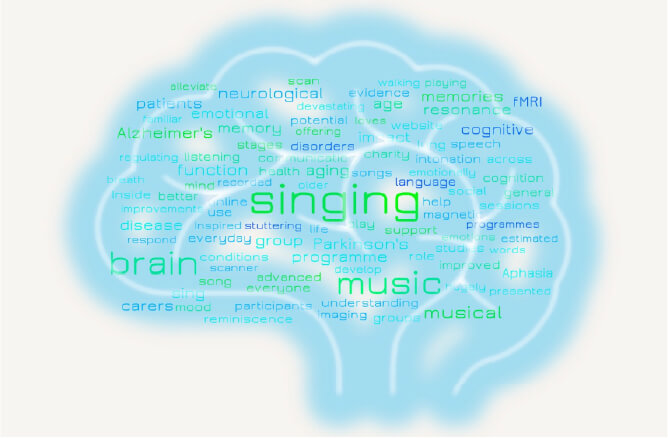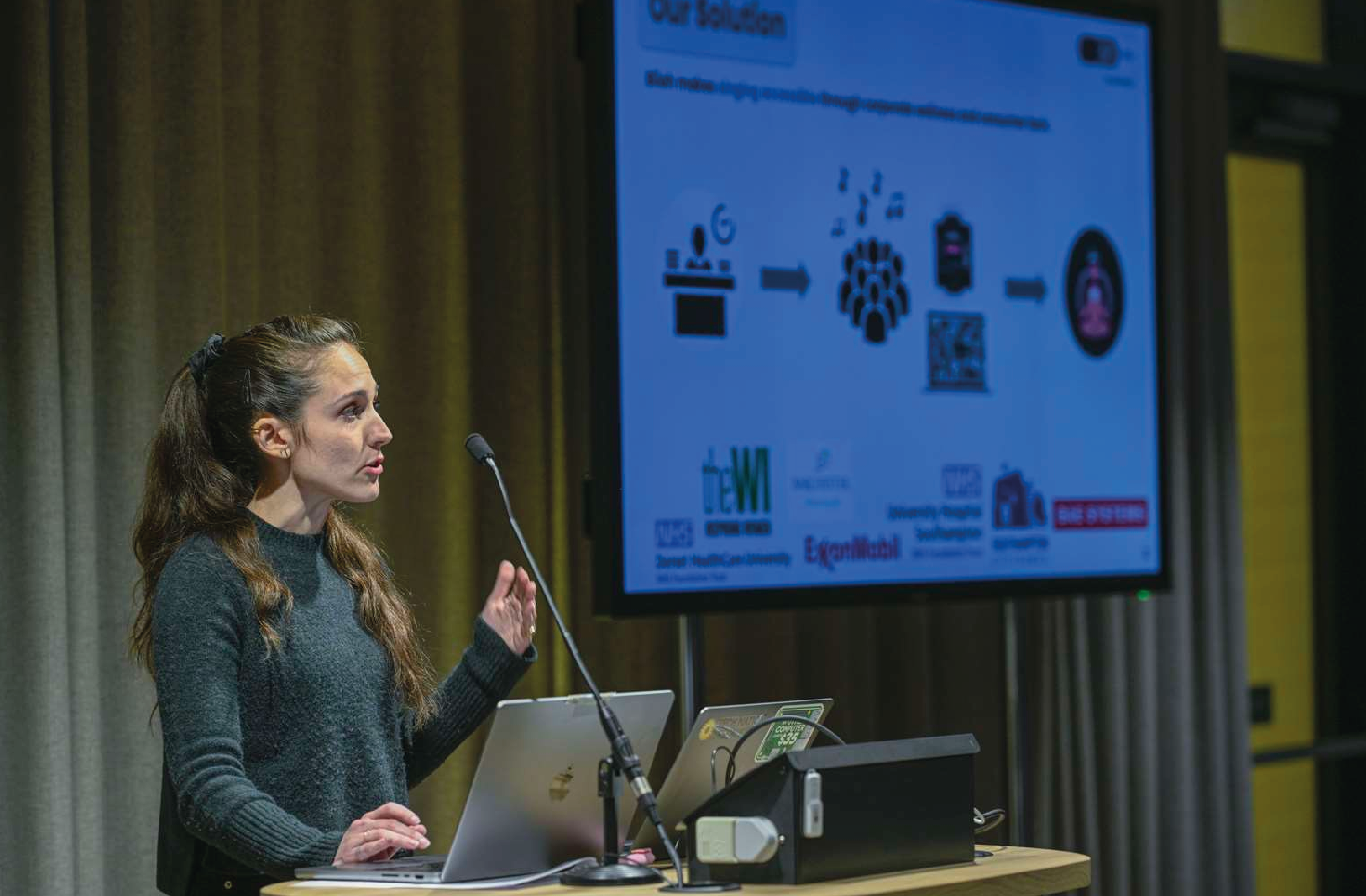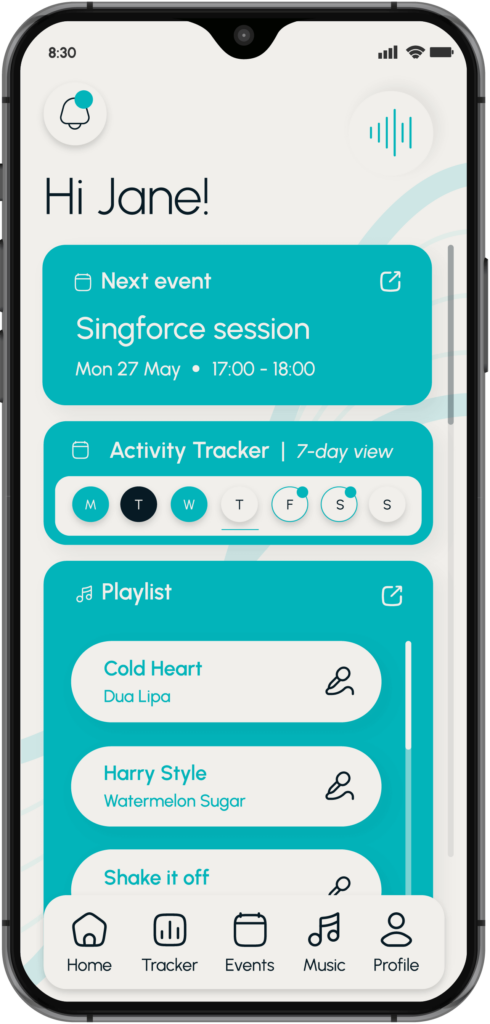
Singing has a part to play in every stage of our lives. From lullabies that bond parents with their babies, to the positive social benefits of group singing for older people and their carers (see post Singing for Social Cohesion). In this article we focus on the positive impact that singing can have on age related neurological disorders and memory function.
Inside the brain
Functional magnetic resonance imaging (fMRI) is a procedure that allows images to be taken from a patient, inside a scanner. ‘Slices’ across the brain can be repeatedly scanned to build an understanding of how different areas of the brain respond to activities. For example, a brain scan can be performed whilst someone is listening to music[4], or even singing. It is clear that the brain responds specifically to musical stimulation.
Singing for the brain
Musical activities promote brain function and emotional well-being during normal aging. We are not even considering formal music therapy, but everyday musical activities that anyone can do, like listening to music, singing, playing an instrument, or dancing. They all have a positive effect on cognitive, emotional, and neural function during normal (healthy) aging. Given the aging of the world’s population and the societal impact of age-related sensory, cognitive, and motor decline, there is huge potential for the positive role that music can play in the care and rehabilitation of people with aging-related neurological diseases, such as Alzheimer’s disease and dementia.
Singing directly stimulates the musculature associated with respiration, phonation, articulation and resonance and requires breath control to sustain notes. We have already written about the potential for singing to treat lung conditions (see post Breathe). However, the fluency-enhancing effect of singing, resulting from increased phonation duration and intonation, has also been shown to have a positive therapeutic effect on neurological disorders, such as stuttering, in several studies.
It has been estimated that over 80% of patients with Parkinson’s disease develop voice and speech problems at some point. Several studies have shown that singing enhances already established vocal therapy programmes. There is also evidence that singing can be used to improving walking gait among people with Parkinson’s.[3] The Canterbury Cantata Trust launched Sing to Beat Parkinson’s (STBP) in January 2018, a network of singing groups for people with Parkinson’s and other neurological conditions, which has a growing number of groups across the UK and is currently offering online support. Aphasia is a devastating complication of stroke or brain injury that results in the loss of ability to produce and/or comprehend language. Inspired by the clinical observation that patients with non-fluent aphasia can often sing the lyrics of a song better than they can speak the same words, a technique termed melodic intonation therapy (MIT) has been shown to produce improvements in expressive language.[8] Functional magnetic resonance imaging (fMRI) of the brain has shown the enhanced effect of MIT over non-intoned speech therapy.[6, 7]
Music and Memory
Music continues to play an important role in adulthood and old age as a way for regulating mood; evoking memories; maintaining self-esteem, competence, and independence; and reducing feelings of loneliness and isolation.
Music-induced emotions and memories are often preserved even in more advanced stages of dementia. People with Alzheimer’s disease have been shown to recall verbal material better when it is presented in a musical form (for example as a song lyric) compared to a spoken context. Overall, evidence seems to suggest that exposure to music has an immediate positive emotional and cognitive effect and that songs may function as a mnemonic aid in dementia. [5]
In the early stages of dementia, identifying songs that are emotionally and autobiographically important to the patient have been shown to have an even greater effect when used by caregivers using music in everyday life at home, for example for relaxation or reminiscence. Both singing and music listening help to maintain general cognition and alleviate depression, but singing has been found to be more effective in enhancing working and episodic (autobiographical) memory. Regular group singing improved performance on tests of general cognition and visuospatial processing in patients with dementia. A karaoke-based singing training program improved psychomotor speed and mood after 6-months. [5]
Reminiscing through familiar music can facilitate interaction for with people living with dementia, providing an alternative way to connect and supporting social engagement. Singing for the Brain is a programme using group singing for people with Alzheimer’s and their carers.[1] A UK charity, the Alzheimer’s Society, is running virtual and online sessions, and even a Singing for the Brain service by phone (ring and sing!) see www.alzheimers.org.uk. The programme is also supported by Age UK, who have a section on their website dedicated to Dementia and Music.
The My Musical Memories Reminiscence Programme (MMMRP) builds on Singing for the Brain. An important feature is the advance collection of information about the musical preferences of the participants with dementia before they take part to make a personalised CD for each patient, which participants and carers can use after the sessions. The programme has been shown to support reconnection with past memories and encourage non-verbal communication, which is hugely beneficial for people with advanced dementia.[2] The power of personalised music to reconnect people with dementia, even those who can no longer verbalise, is demonstrated movingly in this video by the charity Music for My Mind.
Music for my Mind’s long-term vision is for every care home in Britain to have a music programme, and for everyone living with dementia to benefit from music as an integral part of the therapy and care they receive. They are considering research questions to optimise the benefits of music for people with dementia, such as:
- Is there an optimum length for a song, in order to observe an emotional response?
- Is there a particular time of the day when music listening has a better effect?
- Does a specific type of music help in certain moods – e.g. calming music when people are agitated and distressed?
- Will the same music have similar effects on successive occasions?
The charity Playlist for Life lists free resources on their website to help at each stage of curating a playlist; from finding tunes to using music effectively and incorporating a playlist into a daily routine. Their vision is for “everyone with dementia to have a unique, personal playlist and everyone who loves or cares for them to know how to use it.”
Author: Dr. Sam Duffy
References
[1] Bannan, N. and Montgomery-Smith, C. 2008. “Singing for the Brain”: Reflections on the human capacity for music arising from a pilot study of group singing with Alzheimer’s patients. Journal of The Royal Society for the Promotion of Health. 128, 2 (Mar. 2008), 73–78.
[2] Evans, S.C. et al. 2019. ‘Now He Sings’. The My Musical Memories Reminiscence Programme: Personalised Interactive Reminiscence Sessions for People Living with Dementia. Dementia. 18, 3 (Apr. 2019), 1181–1198.
[3] Harrison, E.C. et al. 2017. The feasibility of singing to improve gait in Parkinson disease. Gait and Posture. 53, (Mar. 2017), 224–229.
[4] Koelsch, S. et al. 2006. Investigating emotion with music: An fMRI study. Human Brain Mapping. 27, 3 (Mar. 2006), 239–250.
[5] Särkämö, T. 2018. Cognitive, emotional, and neural benefits of musical leisure activities in ageing and neurological rehabilitation: A critical review. Annals of Physical and Rehabilitation Medicine. 61, 6 (Nov. 2018), 414–418.
[6] Schlaug, G. et al. 2010. From singing to speaking: Facilitating recovery from nonfluent aphasia. Future Neurology. 5, 5 (Sep. 2010), 657–665.
[7] Schlaug, G. et al. 2008. From Singing to speaking: Why singing may lead to recovery of expressive language function in patients with Broca’s Aphasia. Music Perception. 25, 4 (Apr. 2008), 315–323.
[8] Wan, C.Y. et al. 2010. The therapeutic effects of singing in neurological disorders. Music Perception. 27, 4 (Apr. 2010), 287–295.





